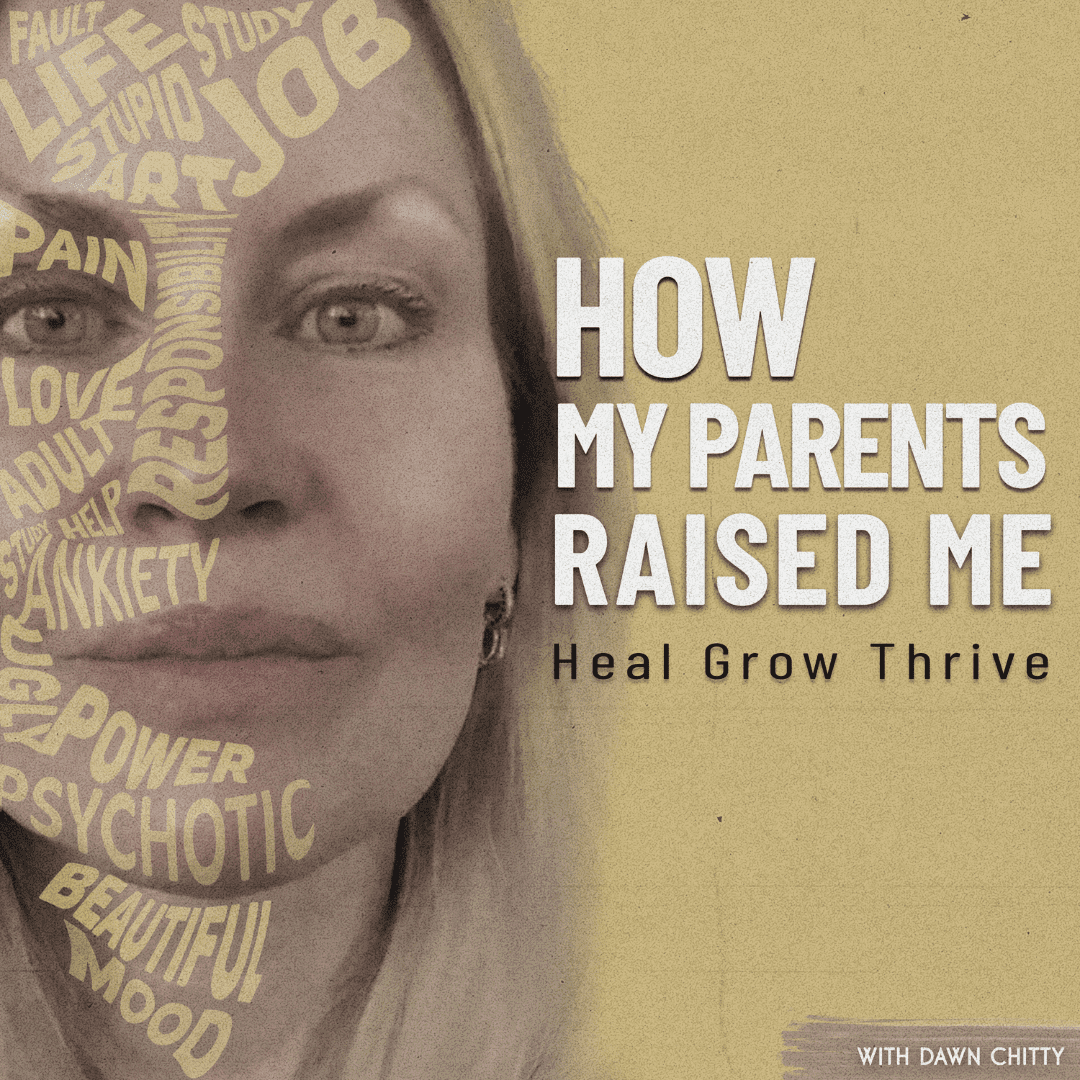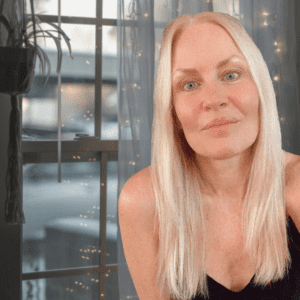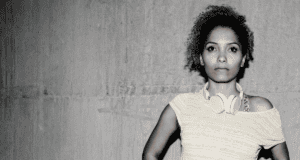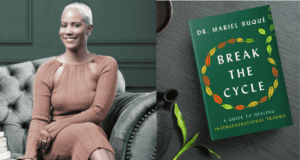Break The Cycle With Dr Mariel Buque´
I was recently honored to sit down with Dr Mariel Buque´to talk all things generational trauma and breaking the cycle. And it was FIRE! Here is the full chat…
HMPRM Dr. Mariel Buque´ Welcome to the podcast. I’m so excited for our chat today. You are a licensed psychologist and an intergenerational trauma expert, and you infuse ancient and indigenous healing practices such as sound bath meditation and breathwork into your therapy framework.
You’re the author of the book, Break the Cycle, an important and comprehensive guide for healing intergenerational trauma and stepping into a legacy of abundance and peace. You are well known for your beautiful tea sessions on Instagram, where you share the tea. And tips on breaking the cycles today.
We are going to get all of our questions on intergenerational trauma answered, but first I’d love to dive a little bit into your own story. How would you describe yourself as a child?
Dr Mariel Wow. I don’t think I’ve ever been asked that question. Also, thank you very much for having me and for just. Being willing to have a conversation about generational healing.
As a child, I was very much shy and withdrawn and one might say introverted. And my mother always tells the story of when I was still a toddler and the neighbors had actually Mentioned to her that she didn’t even know that she had a, a, a kid in the home because it was just so quiet. I never cried.
I was always just so somber. So I was always a very, very, like, even keel, quiet, introverted, somber, withdrawn kid. And, and it, it really, that temperament followed me. Throughout almost all my life and now I have to step a little bit out of that introversion in order to do my work. But certainly that’s been where I, where I first started off.
HMPRM So did you feel a lot of love in your home?
Dr Mariel Mhm. You know, that’s the one thing that I do believe kept my, my family, perhaps one might say like intact enough growing up because recently I was actually having a conversation with my father.
I have conversations with my parents about intergenerational healing all the time, as you might imagine. And in having this conversation with him, He was reflecting upon what he had inherited in his family and he mentioned to me that the common thread that he saw between what he inherited and what he gave to us was that there was an inheritance of love.
So there were other things that were missing and there were other things that we had to in essence learn to give each other now, as adults, But the love was always present for sure.
HMPRM And that is incredible just to have that love there, Mariel, you were born in the Dominican Republic and you migrated to the U S when you were five years old, you described growing up in poverty and the deep intergenerational poverty that runs in your family.
Can you tell us more about that?
Dr Mariel Yeah, absolutely. You know, poverty is trauma, and the reason why I see it as such is because there are so many ways in which poverty strips you of your humanity and your capacity to really, you know, feel worthy, feel like you have a sense of safety, worthy. of love, right?
Like there’s so many things that poverty instills in us psychologically, and it can be very traumatizing. And that’s not even taking into consideration the ways that poverty strips us of resources. And so for on both sides of my family, both my maternal and paternal side, there have been deep histories of poverty.
In the Dominican Republic, there is What we globally know as deep poverty where people really, you know, can even not survive in, you know, and actually lose their lives because they don’t have meals to eat. And so that’s the, the, the level of poverty that I descend from and it’s, you know, it’s it one in which people have to live in perpetual survival mode.
So when I talk about intergenerational trauma, I talk about it from the perspective of having even a personal understanding of the different ways in which for generations, we could be in survival mode in one family unit. Yeah. And poverty creates a deep scarcity mindset, doesn’t it? And there’s so much guilt around money.
HMPRM How did those beliefs play out for you as you grew into an adult, do you think?
Dr Mariel You know, it still plays into my life. And it is a cycle that I am breaking on a continuous basis because it always plays the background of how I engage in a money mindset. For example, I have found myself recently doing a lot of things at no cost just because I, I would like to help.
And I keep forgetting help is actually my profession. So, I have to. I have to wonder, you know, to what extent is it that my perceptions of worth or, you know, conversations about money, which are always very uncomfortable for me to what extent are any of those things playing into how I’m deciding to negotiate my fee?
And, and so it, you know, it, it’s, it’s an ongoing process. I’m way better at it. And I. I can stand pretty firmly whenever I propose my fee to folks, but it, it is something that is, is just so hardwired that the undoing of it requires two things. It requires that I unlearn, but it also requires that I have an element of compassion for myself for how deep that programming runs.
Through me and and it also helps me to develop compassion for others when I’m working with other people on breaking cycles and and I see them perhaps like tumble back into the patterns that they consciously know aren’t good for them, and they’re consciously trying to break but unconsciously, we have, , a host of different messaging and that messaging sometimes just if it goes uncontested, it can actually, feed us back into the cycles that we’re trying so hard to break.
HMPRM And is it really just practice, like, in this case, if you’re trying to break that mindset, that deep mindset around money? Is it really just continuing to take another step in a new direction?
Dr Mariel Yeah, it’s, it’s training and retraining and retraining for sure. So that’s a big part of it. Now, the training and retraining has to happen at multiple levels.
So when I talk about generational trauma, I always try to help people understand that the level of wounding usually is and it’s not just layered because it happens through generations, it’s layered because generational trauma is known to be a wounding of the soul, which means that it you become wounded in your mind, in your thoughts, in your emotions, in your body, meaning that That whatever trauma you experience is also being recognized by your body and interpreted and metabolized inside of your body.
And you get stress and tension pockets that represent a stressed and traumatized body. And then also in your spirit, in the ways that you connect with others, in the ways that you connect with yourself, in the relationships that you hold to all the universal elements of life. It’s in all of that. So when we’re talking about healing, we’re talking about healing in mind, body, and spirit always because the wounding has happened on all of those levels.
And so the healing must also happen with a multi level approach. And that’s why it’s not easy, right? It’s why, it’s why it takes time because there’s so many layers to it. And when you immigrated to the U S at five years of age, your father was. He was not able to come with you and be a part of your life until you turned 21 because of immigration law.
HMPRM Why, why was he unable to be in the US?
Dr Mariel You know, he came for, on a visa for two years and visited us and came and stayed with us and we were family again. But then the visa, he was supposed to be here to, in essence, to procure his residency and he didn’t get it in time. So you had to return back to wait for it in the Dominican Republic.
But then that became a 10 year separation thereafter. And this is something that is really common in immigrant communities where we have one or both parents that aren’t present because of immigration law, because immigration law, you know, it vacillates, it changes, and it creates a disruption in the lives of families and in the, the connection that families can have with one another.
And it certainly did happen to mine. And it really was just, you know, my father having to await his U. S. residency. And for some people, it would come sooner than others. It came sooner for my mother, my sister, and I than it did for my father. But unfortunately, the gap between us and him was about 15, 16 years.
And so it was a very long time, which meant that the entirety of my childhood, with the exception of those two years, were, were, I basically lived without my dad. It’s so unfair, the immigration system, isn’t it? I mean, it’s exactly the same where I live and it’s so set around rules and there’s nobody stepping in and saying, but what about the actual people here?
This is a family, how do we, how do we make this work better?
HMPRM So how did not having a dad around affect you growing up?
Dr Mariel Well, you know, for one of the more logistical ways in which it affected myself and my sister was that we didn’t have that added protection and income present. And so when we’re talking about generational poverty, and we’re talking about not being able to move the needle on that, because now only one parent is present working for everyone, then you know, it becomes pretty evident that something like immigration policy contributed to the perpetuation or the continuation of trauma within my family unit.
And that’s why when it comes to generational trauma, I always tell people, listen, we have the mind, body, and spirit, but we also have The culture, the society at large, we have collective traumas that are amassed by groups of people, immigrants being one groups of people, right? That is also a part of how trauma is perpetuated.
And then it continues down the family line because now you have Myself, my sister, my mother, and my father, two generations that have already had that, that multi generational suffering of immigration trauma or immigration and poverty trauma. And so, we have to basically make the connection between all of the systemic nuances, injustices, practices, and the ways that it impacts families for the long term from, from a trauma perspective.

HMPRM And I suppose as a little child, your understanding of what’s going on, I mean, somebody can explain to you, your dad can’t be here because of these reasons, but as a little child, it’s really just dad’s not here. It’s like an abandonment really, isn’t it?
Dr Mariel It is. And it’s a complicated abandonment, just like, you know, I would call it a version of a complicated grief.
It is a parent that is not present, but desires to be a parent who isn’t present, but is writing you letters because now, you know, I’m, I’m nearly 40. So we’re talking a number of years ago, right? When we actually didn’t have a lot of access to international calling back then when you had, you know, like more antiquated phones.
And so we would send letters to each other and photographs to say like, this is what I look like now, you know? And so. the fact that you had all of that love and desire to be present and desire to not be forgotten and yet there was nothing you could do about it. That’s another way in which complicated grief enters families through this process.
HMPRM So much grief there. And do you think that that abandonment is still a trauma that you hold now?
Dr Mariel I would say that in my early adulthood, I definitely had to grapple with what it meant to have relationships with men that were potentials or intimate partners. and feel that, that sense of void around my father’s not, not being present. So, you know, because I’ve been so fortunate to be a psychologist and work so much on myself and do so much of the work, it isn’t something that I struggle with currently, but it did, I believe, create some fracturing in my earlier relationships as I was emerging into my adult life.
HMPRM Absolutely. And at some point you got involved volunteering in your local community. How did that come about?
Dr Mariel You know, I actually, I think that, you know, our subconscious mind is fascinating because I wanted to be a reporter and so I went into media as my first career. And the reason why I wanted to be a reporter was because growing up.
My dad was a reporter in the Dominican Republic and I wanted to be like him. I think it’s, you know, the way that psychologically I could be close to him by being like him. And, and so, you know, when I got into the media world, I was very dissatisfied with the work. And I actually didn’t want to spend, you know, my my free time doing anything but helping others.
And so that’s what I started to do. And eventually that led me down the path of doing work that was more mental health centered. And it gave me an opportunity to see that I could help my community in that way. And, and it was really kind of the part of the initiation process of getting me to where I am now.
But it was in part because I followed that dream that was basically me just trying to gain closeness to my father. And, you know, the media just wasn’t the place where I felt joy. Psychology is.
HMPRM it’s, it’s finding a sense of purpose, isn’t it? I mean, , you can have the most amazing career, but if you don’t feel any kind of purpose or connection in that, then it’s, it’s not really going to.
give you anything. It’s not going to light your fire, I suppose. And I think we’re all here to find our purpose. So what were you seeing in that community at that time? What were you learning from that community?
Dr Mariel Well, I was learning that people were in a lot of emotional pain. That was part systemic and part individual or personal or family based, regardless of whether there was a combination of personal and family and systemic like, or if it was just one or the other.
People were winding up in places that felt like almost like a dead end. Some of the work that I started doing primarily were with young adults that had been displaced from their homes and had aged out of the foster care system and had been transitioned into transition homes.
And we’re trying to find their way and trying to find their identity and trying to find love and trying to find family and figuring out life maybe for the first time ever because really the ways that their lives had been prior had been filled with chaos and a lot of family dysfunction and, and also, you know, filled with a lot of other things like community violence or you know, them feeling Really out of place in certain spaces or the education system failing them.
And so it was like both systemic and personal. And there were a number of different stories from all of these young minds that, you know, started really impacting me. And I started seeing, okay, well, the common thread is that people are really suffering and they’re, they’re struggling to find their way out of the ashes of this destructive path and there is opportunity here for me to be able to help. I know my community. I don’t know everyone and I don’t know everything about my community, but I know things. I grew up 23 years in that community. And so I was like. I could be a solid person to really bring some healing back.
So why not? Why not try?
HMPRM Yes. So was that your first understanding of generational trauma? Was that the first time that you really saw it in action?
Dr Mariel Not quite. You know, I was just seeing emotional pain, but generational trauma actually came to me when I was working. I was at Columbia Medical Center.
I trained there and then I worked there when I graduated. And when I trained there I was training in my clinical rotation. So I was seeing my own patients and in Some of our, what we call like clinic team meetings, we would have these discussions about some of the people that we would be working with that presented with histories or some difficulties in their lives that we needed our fellow colleagues to like help us brainstorm solutions or ways to actually help the person.
And in every team meeting, and I’m talking about for years, the stories felt the same. It was a different person that we were talking about. A different clinician that presented the case. But it was the same story like, you know, we would have ‘Maria’ who would come from a home where, you know, she had a intimate partner violence, and her mother had.
the same trajectory in her relationships and so did her grandmother and so like There were all of these common threads and people just continue to talk about these stories, but no one was actually saying generational trauma at all Not a soul. I didn’t hear it in my five years there. I didn’t hear it once.
And so I came across the text of Bessel van der Kolk, The Body Keeps the Score, and the text of Resmaa Menakem My Grandmother’s Hands. And between those two texts, and beyond that I came upon, It Didn’t Start With You by Mark Wolynn. And I started just digging and digging and digging and a lot of these texts had some elements of generational trauma or generational healing reflected within.
And that’s when I started to realize, okay, you know, there’s a name for this. We are just not bringing it into these clinical spaces. And we’re actually not helping from this lens because we are not trained to do so. The clinical model that we’re trained under as therapists, as psychiatrists, as nurse practitioners, as physicians, none of us are trained under a trauma model.
And none of us are specifically trained under a generational trauma model. So nobody knew what we were working with. We were just telling the stories that we were hearing in the therapy room. And not really assigning it some sort of a category so that we could gain a better understanding of what we were really working with.
HMPRM Wow. So how long ago was that?
Dr Mariel 2014. So yeah. So I think by the time that my book, Break the Cycle comes out, it will be an exact 10 years since.
HMPRM Wow. Wow. That’s not very long ago. Is it like, it’s not very long ago. And so has that changed in the way that psychologists are trained? Has anything changed in those 10 years? Or are they still working on the old models?
Dr Mariel Still. Oh gosh. As far as I know, I stopped teaching about three or four semesters ago. And up until that time, I brought in trauma text into my classroom. But it is not the standard at all. There is no… There is, you know, in, in the psychological associations that we have, there is a trauma chapter and there are people that kind of now are perhaps given more space to talk about trauma, but traditionally it had just been like division of trauma and blah, blah, blah.
And if you had an interest in trauma, You would go to that division and maybe learn from some of your colleagues and dive into some texts, and that would be, you know, your trauma world or you would be trauma trained in a, a specific trauma modality, E M D R prolonged exposure therapy and like others, but there has not been a universal.
We must train clinicians to understand trauma and the functions of trauma in their lives and the environmental factors that deposit trauma into their lives. So that we can help them better in a more holistic way. That is not the norm at all.
HMPRM Wow. That’s kind of terrifying actually, isn’t it? When you think about it, it’s terrifying.
And when we start to change those things, we’re going to be changing the world. But it’s, it’s… It’s, yeah, it’s quite scary to think that. I mentioned earlier about your account and sharing the tea. I believe the healing tea is something that came from your grandmother’s love of Tea as a healing medicine.
Is that right? Can you tell us about your grandmother?
Dr Mariel Yes, absolutely. Oh, my grandmother, her name was Tutuna. And she was a very, very petite woman, four foot five, and she had a big personality. And, you know, one time, Actually, not very long ago, just a few years back, my mother was making a tea and she always makes tea, like for as long as I can remember, and especially when we’re sick.
That’s her thing. And I never really appreciated the, the fact that she made teas. how they functioned and how they actually worked and make us well. But the fact that there were certain aromas that I wasn’t really picking up in the teas. And this one time I actually did. And I remember that the reason why I picked up the aroma was because the tea smelled like lemongrass, which was my favorite scent to actually using aromatherapy.
And my mother told me, you know, a story about my grandmother, how she used to use that same lemongrass tea to actually help heal a lot of ailments and sicknesses that her children would have. And my mother learned from her own mother how to help heal with tea. And so my mother was passing on that knowledge on to me.
And I thought, you know, my mother always tells me every time that you’re going to go out and serve, meaning when you’re going to go out and help people, if you’re gonna go do a workshop, if you’re going to do a talk, if you’re gonna, you know, even in the times when I was doing therapy she would always tell me, like, Just remember that you have to, you know, like ask for the wisdom and prudence and guidance to be able to hold space for whoever it is that has decided that you are the person to help them.
And I, I feel like it’s like, Such a different way to approach therapy where it’s to me It’s like an honor to serve another person in that way rather than I’m just your therapist and I’m giving you therapy like no You like your whole life is literally being deposited You know into my hands for me to help you sort it out.
Like that’s major You know It’s it’s a really big deal as I see it and I and I don’t take that lightly and I feel very honored to do that. So what what I decided that I was gonna do With with tea in a more public way was the, the little therapy nuggets that I would be like providing folks, I thought, you know, during the pandemic, everyone was feeling like isolated and lonely.
I thought, let me just break the fourth wall. Let me just like, kind of like, almost like if I were to reach out through the Instagram screen and say, Hey, come, let’s have tea. And so that’s what I did, because that’s what we do at my home. We have tea.

HMPRM Yeah, it’s beautiful. And it’s so inviting I just see you on Instagram, preparing the tea. You always have some beautiful new cups or instruments or I don’t know, like there’s always something gorgeous there. I’m like, Oh my gosh, she makes tea look so appealing. So your grandmother made these beautiful teas and there’s so many healing things, aren’t there, that we have in all of our cultures around healing, but was it a part of your culture to talk about mental health?
Dr Mariel No, not at all. And I think that if I, if it would have been, I probably would have figured out that I would have wanted to be a psychologist very early on in my life rather than this be, you know, a second career. Mental health is, it holds a stigma and It holds an element of silence throughout the world, but it definitely is the case in the Latinx community, and it made it so that many of the issues that were permeating through my family weren’t really discussed.
They were kind of brushed under the rug, and Now we have such open dialogue that I think if someone were to actually peek into my family’s living room, they would be like, Who are these people? Because we’re so open about conversations that are really hard and traditionally have produced a lot of shame in us.
But we have been. willing to have the conversations that are courageous and are multi generational and take into account all the things, right? Like ways in which my father has embodied elements of his own masculinity that didn’t serve him or us. Ways in which my mother would have, \ responded, perhaps with a harsher tone to folks whenever she felt like her buttons were being pushed, and how she modeled that to us, and how I, you know, had a similar nervous system structure to the ways that she did, like all the things and we can have these conversations.
in a way that humanizes each of us rather than hurts us or further shames us. But it is, it has taken a very long time. I think, you know, most people we want it resolved right away because we just don’t want to feel the pain anymore. But these conversations have been happening within my family unit for at least a decade.
HMPRM Oh, that’s amazing, isn’t it? And just, just the weight that comes off when you talk about that, just being able to sit with family and talk through these things, because some people never ever get to do that they just, they don’t have family that, that want to change or want to do things in a different way.
Do you believe that most people have a level of generational trauma?
Dr Mariel Now I do. I used to be a bit more reserved about assigning the title of trauma to basically the world, but I do believe that most of us, even in our lifetime, have some event or series of events that have caused us some level of a traumatic experience.
Some of us stay in that. Some of us don’t. Some of us just transition from. the experience of trauma and are able to surface out of it. And it’s not that one person is stronger than the other. It’s just, you know, the multiple, multiple factors to consider. But now, being the clinician and the scientist that I am, seeing the world as it is now and doing this generational work, I do believe that most of us do hold some element of trauma.
And then, We have to take into consideration the current world that we’re living in as well. We’re living in a world where almost all of us, if not all of us, has had some level of grief or some, some version of an emotional pain that was associated with the pandemic. We’re also, you know, bracing ourselves for what’s going to happen to Earth, right?
So a lot of people are like, you know, just. Experiencing a lot of natural disasters that are also deeply traumatic and injure or harm or kill a lot of our community members in the process. And so there’s so many things that are happening that are also a part of the global culture that is also traumatic.
And because we are in such a globalized, Economy, like everybody is connected in some way or another now that we have like the world that our phones, it makes it so that vicarious trauma or secondary trauma is very possible for all of us.
HMPRM Absolutely. And you spoke about the way that your family can now speak about things.
What do you think were your first steps towards? Healing your own trauma or healing with your family. Was it just an opening conversation?
Dr Mariel No, it was messy and ugly and chaotic like most of us. Now it looks a little more finessed and I’ve also adopted, you know, the same mechanisms that I talk about in my work and in my book.
But before it didn’t look like that because I actually didn’t have a roadmap. Because there wasn’t one. And so, all I knew is that I wanted things to be different. And most cycle breakers, I consider myself a cycle breaker. Most of us do understand that things cannot remain as they are. That we must disrupt the status quo.
That we cannot enter yet another generation of deep, lifelong suffering. That, that things have to be different. And as a result, we go off of intuition or whatever kind of internal resources and creativity we can muster up to change and shift and do things differently inside of our family unit, whether that’s leaving the home.
Or if that’s not feeding into toxic cycles that we understand are part of our family unit, or if it’s erecting boundaries that we understand need to be in place in order for there to be a healthier relationship, or if it’s, you know, not rearing our children in the ways that we were reared, like maybe opening up dialogue for emotions for our children in ways that we didn’t get to experience.
It’s like in all of these things that we intuitively before, you know, of course, some of the recent write ups and then my book, like we intuitively just knew that we wanted things to feel and look different and that we deserve the better legacy than. What we were experiencing, even if that wasn’t necessarily our parents desire for us, but they did what they could.
And then we just had to pick up from where they left off and like, do the rest.
HMPRM Absolutely. I know from my own experience after I had my own kids, but I just spent years in unwellness and chronically tired, just. Just unwell. And I started to understand about the trauma that was driving that and about how the nervous system is affected by trauma.
And it was like 4 million light bulbs went off and I was like, the nervous system, it was just so. It was just this huge piece of the puzzle. Can you talk us through the connection between trauma and the nervous system?
Dr Mariel Yes, absolutely. So when we’re talking about the body element of trauma, meaning like we said, you know, mind, body, and spirit is impacted.
And so the body is. impacted through the nervous system primarily. So our nervous system is always capturing everything that’s happening to us. And if something feels either acutely stressful or chronically stressful, acutely meaning, you know, something happened that really disrupted our sense of well being or threatened our life, like perhaps, you know an accident, right?
Something like that. Or if, if it was more chronic, meaning that, you know, in, in your childhood home, like you were constantly psychologically abused, right? Like that, that was an ongoing chronic stressor. That whenever these things happen, our nervous system is basically set to absorb the stress. and understand that a threat is present, and so it prepares itself to fight off the threat.
But if it feels like the threat is way too big, meaning acute, or way too long standing, it basically tires out, and it defaults into a threat response for the long term. meaning that you’re always in this nervous system overdrive and believing that a threat is coming. So you’re always afraid or always in, you know, in a state of worry or always in a state of sadness.
And there’s always this like preparation for when, you know, the next thing is going to come that’s actually going to threaten your safety. And that’s when we can say, you know, your nervous system is in essence, like in a frozen state or defaulted to a nervous system overdrive response.
So when we’re talking about trauma, a lot of what we’re talking about really is being stuck in that nervous system response, which is why And I stress so much the fact that when we’re working with trauma, it is critical for us to integrate body based practices that can help us to not only release the tension and the stress and the pre programming that’s in our nervous system, but also like to wire us and wire our nervous system and our neurons and our, and even our brains to things that can be healthy and adaptive for us.
Rewiring to joy rather than to fear. And so that’s a critical part of what we do with intergenerational work, especially because generational trauma is the only category of trauma that has that biological element where trauma can be passed down from parent to child.
HMPRM And as kids growing up in trauma, we often don’t learn boundaries or perhaps even realize that there’s such a thing as boundaries and having no boundaries allows other people to treat us badly.
And often there can be very clear red flags around people’s behavior that we don’t recognize. How can we start to recognize and take notice that there are red flags around people’s repeated bad behavior.
Dr Mariel You start noticing it on different levels. I would always urge people to do a check-in with themselves and to do many.
But the check-in that you do for it to be multi-layered, right? We’re talking about mind, body, spirit so it’s gonna be critical to assess what kinds of thoughts you have around certain people, what emotions come up for you when you’re close to somebody in your family or in your friendship circle or in your amorous relationships.
When it comes to the body, it’s critical that we tune in and Get a sense of how our body is responding to people. Sometimes our bodies are really tense when we’re around certain individuals and we’re just not realizing it. And our bodies can be very telling of what our subconscious mind is trying to, you know, tell us or what our subconscious mind is feeling in reference to someone else.
And then it’s important that we also assess from a spirit based perspective, like, what’s the quality of our relationships? Do we feel like they lack balance? Do we feel as though they are nourishing? Are they chaotic and tumultuous? Or are they stable and reflective of peace, right?
It’s going to be imperative that we do almost kind of like a full systematized analysis of us with others and the ways our mind bodies and spirits are responding to our relational environments.
HMPRM And listeners of the podcast are here because they’re done with generational abuse, abandonment, all the things.
We want to be the cycle breakers for our families. What are the qualities of a cycle breaker? What makes somebody a cycle breaker?
Dr Mariel Oh, I love this question. You know, a cycle breaker is like I mentioned, someone that definitely comes out of like a place of sheer intuition and just understands, like, I want better.
Not just for myself, but I want better for the people around me. I want better for the next generation. I want better for the global community that I’m a part of. I want better for even my local community or the people that are a part of my cultural identities that share cultural identities with me.
And you being that person that understands that. You deserve peace and you deserve a different legacy for yourself, for your children and for your children’s children and everybody that comes thereafter. That in and of itself makes you a cycle breaker.
Now you take steps. outside of that to then create the setup for cycle breaking work, but you already determining that you have to disrupt the status quo and break through the cycles that have existed already puts you in the category of cycle breaker, which I am so grateful that I get to be in, in an era and a generation where I get to witness a lot of us collectively Proclaiming that title and saying like, we are here to shift our lineages into intergenerational abundance and not the intergenerational pain that has been so present for us.
HMPRM So what would be one first step that somebody could take towards that?

Dr Mariel Well, the first thing that would be essential and probably The most essential element of what it would take to continue the path of cycle breaking would be to work on settling your own nervous system, and I know that that oftentimes throws people off because I think people are Usually thinking I’m going to go into, well, do this in your relationships and that’s not quite it because if we think about what happens when we are in our worst selves, let’s call it for lack of a better term.
But when we are like deep in a trigger and we just enact behaviors that don’t coincide with our values. Typically, what’s happening is that your entire body is in an energetic upsurge, trying to help you survive that moment. And it’s perceiving that everybody that’s around you, or the person that you’re having, argument with, that that person is a threat.
That person’s the enemy. Because your body is feeling so overwhelmed by itself that it can only see red. So when we’re hoping to establish better relationships, we first have to dial back that threat system, that alert system that’s telling us that this person is the enemy. First we need to work on that and settling ourselves with enough repetition so that our bodies can start restructuring to…
calm and ease and feeling more settled, and then we can enter the conversations that we’re having, probably the same conversations, but enter them with a more restored and relaxed and calm and reflective and connecting nervous system than one that is overactive and on fire and disconnecting from others.
HMPRM Oh, yes. Everything you just said. I’m just like, Oh, yes, that is exactly it. I totally relate to that. Sometimes we’re stuck in families where nobody else wants to heal or even wants to know about healing. So how can we move forward when nobody around us is moving with us?
Dr Mariel Well, the one thing that I will say is that it is possible because most people feel like they’re going back into environments and they feel almost overwhelmed by how powerful the triggers are there.
But one thing that is important to remember is that if you work on your own trigger responses and you help yourself. to feel less and less and less triggered by the same environment, you would have already done a lot of the work to break these cycles, right? Oftentimes, and more often than not, I, I don’t think I’ve even met a single cycle breaker that doesn’t have an environment that they have to step back into that’s hurtful or harmful or triggering.
The role of the cycle breaker is, one, to know that by healing yourself, you’re also healing your family in a way because you’re not feeding the cycles that are there. But also, you’re helping yourself to absorb less of the stress and the trauma that’s in that environment by helping yourself. To settle yourself and settle your mind and your body and spirit more.
HMPRM I love that so much. And your therapy framework includes many ancient healing practices. I saw you enjoying an incredible water sound bath healing ceremony, which looked amazing. What, what are your favorite healing treats?
Dr Mariel You know, I love to be in the sauna. You know, we were talking a little bit earlier about how I love heat and I come from the heat, right?
So born right by the beach. And so. Whenever I’m in the sauna, I feel like I’m being wrapped in a warm hug apart from all the multiple benefits that of course that it gives me. So that’s one thing that I love to do. You know, tea making has become an actual self care practice for me. And it’s not just something that I kind of produce for You know, like social media consumption.
I actually engage in tea ceremony for myself And it’s something that brings me a lot of joy I take my time with my tea making and and I savor it and it’s something that and also just exploring new teas Like, you know, I went to Mekonos a few years ago and they had like this Greek mountain tea that had this very subtle notes and like being able to like Explore the world’s teas is also something that I, I’ve been loving a lot in the recent years and has brought me a lot of joy to just kind of get more acquainted with like all the beautiful miracles plants all around us.
And I’m really taking to water lately. So water sound baths, but also just floating and just being present with water in a meditative way has been really, really nourishing.
HMPRM Mm. It all sounds so beautiful. Dr. Marielle, you’ve written an incredible book that is going to be very important to many, many people. It is called Break the Cycle, a Guide to Healing Intergenerational Trauma. What do you want us to know about your book?
Dr Mariel Well, the book is. It’s very intentionally created as a healing guide for all of us to reference, to work through, practice from. And it is for, it’s in essence, my generational gift to all cycle breakers.
It’s there for us to actually take from the book, everything that we need to actually break these cycles. And so my hope is that. That cycle breakers will feel more equipped to do the work rather than just going off of intuition, which is what we’ve been doing. And that there is a roadmap and a strategy and a way that they can gather from this book so that they can have an, you know, at least some sort of a template for what to do in most of the circumstances that are connected to generational trauma.
HMPRM Hmm. And it’s definitely needed in the world, isn’t it? And you call it going from intergenerational trauma to intergenerational abundance, which is such a beautiful term. You can find Dr. Mariel Buque´ on her website at www.drmarielbuque.com. And please do go and follow her on Instagram, which is at drmarielbuque and there you’ll find so many wonderful posts with Dr. Marielle sharing the tea.
Please do go and purchase a copy of Break The Cycle because the best thing that any of us can do on this journey is to learn more and more about how to heal, right? It’s the only way that we can create change.
Dr. Marielle, thank you so much. It has been an absolute honor to hear your personal story today and to be able to soak up so much of your beautiful and incredible wisdom. The work you are doing in this space is changing many, many lives and that’s how we change the world! So we appreciate you so much.
Dr Mariel Thank you. Thank you so much for your kind words and for having me.









